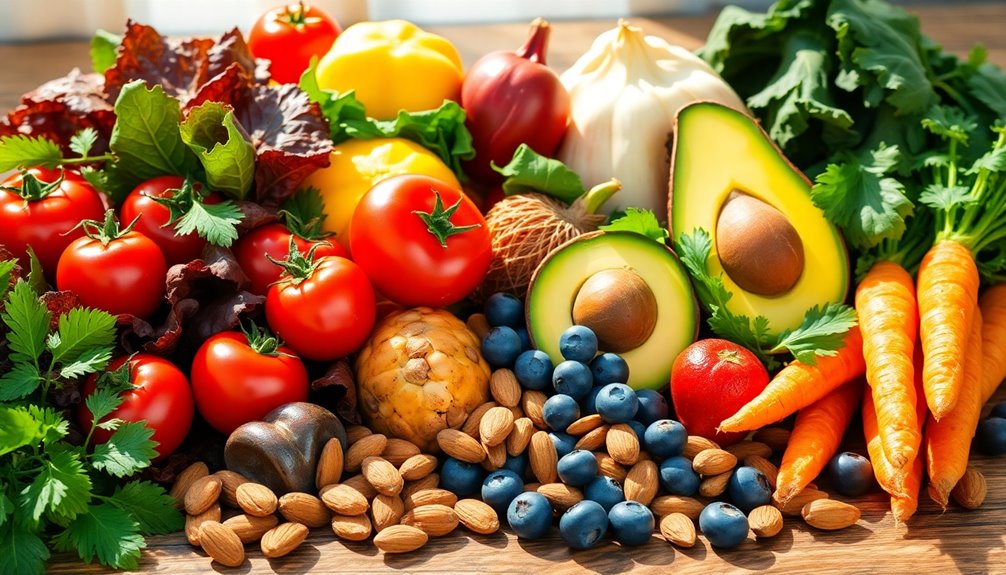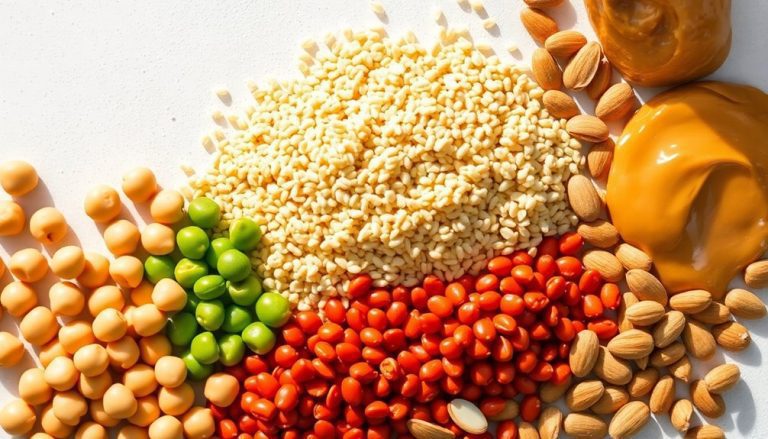Choosing nutrient-dense foods is crucial for your health. These foods deliver essential vitamins, minerals, and antioxidants without empty calories. They energize you, support your immune system, and reduce the risk of chronic diseases. Incorporating fruits like berries and leafy greens boosts your nutrient intake while promoting satiety—helping you resist unhealthy cravings. Whole grains and healthy fats not only nourish but also enhance digestion and cognitive function. Staying hydrated is equally important for nutrient absorption. By focusing on these foods, you're laying the foundation for a vibrant, healthier life. There's much more to uncover about optimizing your diet.
Key Takeaways
- Nutrient-dense foods provide essential vitamins and minerals, enhancing overall health without empty calories.
- They support immune function, reduce chronic disease risks, and promote mental clarity and mood.
- Protein-rich foods aid in tissue repair and muscle growth, crucial for physical health.
- Whole grains and healthy fats contribute to heart health, satiety, and energy production.
- A variety of fruits and vegetables ensures a broad spectrum of nutrients, promoting digestive health and immunity.
Importance of Nutrient-Dense Foods
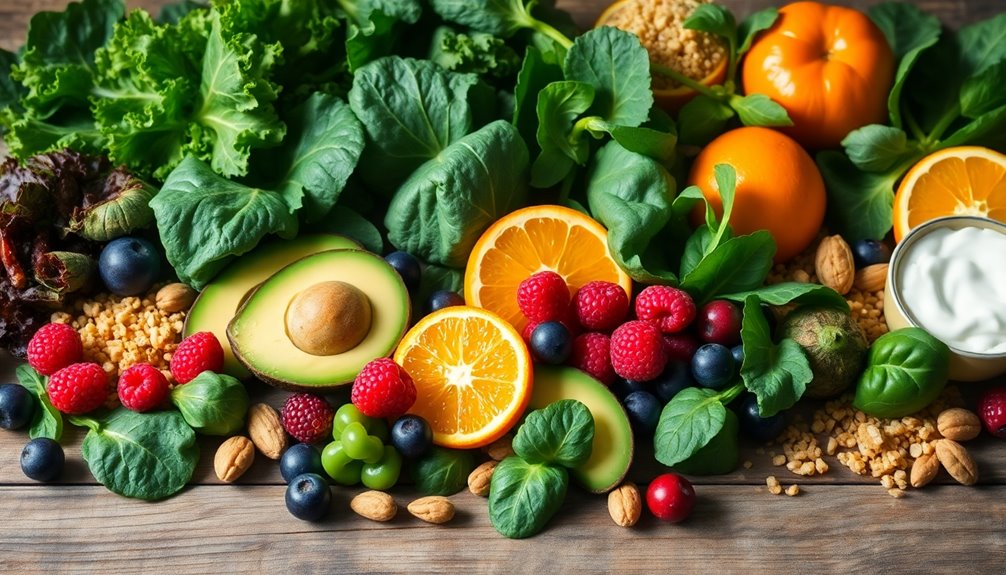
Why are nutrient-dense foods crucial for your health? They pack a powerful punch of vitamins, minerals, and antioxidants without loading you up on empty calories. When you focus on these foods, you're fueling your body with what it truly needs to function optimally. Additionally, incorporating fresh herbs into your diet can enhance the nutritional profile of your meals while providing unique flavors.
Imagine replacing sugary snacks with fruits, vegetables, whole grains, and lean proteins. You'll notice an increase in energy levels and a boost in your overall well-being.
Nutrient-dense foods also play a vital role in preventing chronic diseases. By choosing options rich in nutrients, you're actively supporting your immune system, maintaining a healthy weight, and reducing the risk of conditions like heart disease and diabetes.
They help you feel full longer, making it easier to resist unhealthy cravings and maintain balanced eating habits.
Moreover, incorporating these foods into your meals can improve your mental clarity and mood. With every bite of nutrient-dense food, you're not just nourishing your body; you're enhancing your quality of life. Additionally, choosing quality plant food can further enrich your diet with essential nutrients to support your health journey.
Key Nutrients to Consider
When it comes to maintaining a balanced diet, focusing on key nutrients is essential for your overall health. These nutrients support various bodily functions, ensuring you feel energized and vibrant. Here are three crucial nutrients to consider:
| Nutrient | Benefits | Food Sources |
|---|---|---|
| Protein | Builds and repairs tissues | Chicken, beans, nuts |
| Fiber | Aids digestion and heart health | Whole grains, fruits, veggies |
| Omega-3 Fatty Acids | Supports brain and heart health | Fatty fish, flaxseeds, walnuts |
Incorporating these nutrients can enhance your well-being. Protein is crucial for muscle growth, while fiber helps regulate your digestive system and can lower cholesterol levels. Omega-3 fatty acids are known for their anti-inflammatory properties and can improve cognitive function. Additionally, essential fertilizer spreaders can help optimize the growth of nutrient-rich plants in your garden. Using quality soil products can also significantly boost the nutrient content available to your plants.
To achieve a balanced diet, aim to include a variety of these nutrient-dense foods in your meals. Not only will this support your physical health, but it will also contribute to your mental well-being. Make informed choices by focusing on these key nutrients, and enjoy the benefits of a healthier lifestyle!
Top Fruits for Vital Nutrients
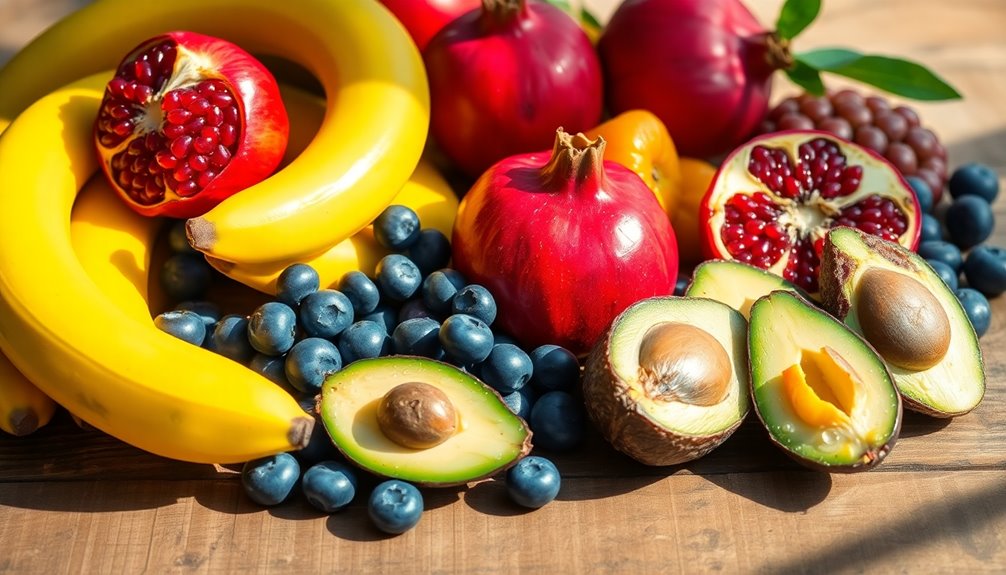
Incorporating fruits into your diet is one of the easiest ways to boost your intake of vital nutrients. Fruits are packed with vitamins, minerals, and antioxidants that support overall health.
For instance, berries, like blueberries and strawberries, are rich in antioxidants and vitamin C, which can enhance your immune system and improve skin health.
Citrus fruits, such as oranges and grapefruits, are excellent sources of vitamin C and potassium, helping to maintain heart health and regulate blood pressure.
Bananas are another great choice; they provide potassium and vitamin B6, which support muscle function and energy metabolism.
Don't overlook apples either! They're high in fiber and vitamin C, promoting digestive health and aiding in weight management.
Avocados are unique as they offer healthy fats along with vitamins E and K, contributing to heart health and skin vitality.
Finally, consider including kiwi in your diet. This small fruit is an outstanding source of vitamin C, potassium, and fiber, supporting immune function and digestive health. Additionally, incorporating fruits into your meals can help you maintain a balanced diet that meets your nutritional needs.
Essential Vegetables for Health
Vegetables are a cornerstone of a healthy diet, providing essential vitamins, minerals, and fiber that your body needs to function optimally. Incorporating a variety of vegetables into your meals can significantly enhance your nutrient intake.
Leafy greens like spinach and kale are packed with vitamins A, C, and K, as well as iron and calcium. These nutrients support your immune system, bone health, and overall vitality.
Cruciferous vegetables, such as broccoli and Brussels sprouts, are rich in antioxidants and may help reduce inflammation. They also contain compounds that support detoxification and improve heart health.
Don't overlook colorful vegetables like bell peppers and carrots; they're loaded with beta-carotene and vitamin C, which are vital for skin health and immune function.
Root vegetables, including sweet potatoes and beets, provide complex carbohydrates and fiber, promoting digestive health and sustained energy.
By mixing different types of vegetables, you'll not only enjoy a range of flavors but also ensure you're getting a broad spectrum of nutrients.
Benefits of Whole Grains

Whole grains are a powerhouse of nutrition, offering numerous health benefits that can enhance your diet. Incorporating whole grains into your meals can significantly improve your overall health.
Here are some key benefits you shouldn't overlook:
- Heart Health: Whole grains are rich in fiber, which helps lower cholesterol levels and supports cardiovascular health.
- Weight Management: The fiber in whole grains keeps you feeling full longer, making it easier to control your appetite and maintain a healthy weight.
- Digestive Health: Consuming whole grains promotes healthy digestion. They provide the necessary fiber to keep your digestive system running smoothly.
- Nutrient Density: Whole grains are packed with essential nutrients like B vitamins, iron, and magnesium, which are vital for your body's energy production and overall functioning.
Role of Lean Proteins
Lean proteins play a crucial role in maintaining a balanced diet and supporting overall health. By incorporating lean protein sources like chicken, turkey, fish, beans, and legumes into your meals, you provide your body with essential amino acids. These amino acids are vital for building and repairing tissues, producing enzymes, and supporting immune function.
When you consume lean proteins, you also help manage your weight. Protein is more satiating than carbs or fats, which means you'll feel fuller for longer. This can prevent overeating and snacking on unhealthy foods. Additionally, lean proteins can boost your metabolism, as your body burns more calories digesting protein compared to other macronutrients.
Another benefit of lean proteins is their role in muscle health. If you're active or looking to increase muscle mass, including sufficient protein in your diet is key. It supports muscle recovery after workouts and can enhance your strength and performance.
Incorporating a variety of lean proteins into your meals not only helps you meet your nutritional needs but also keeps your meals interesting and flavorful.
Healthy Fats and Their Impact
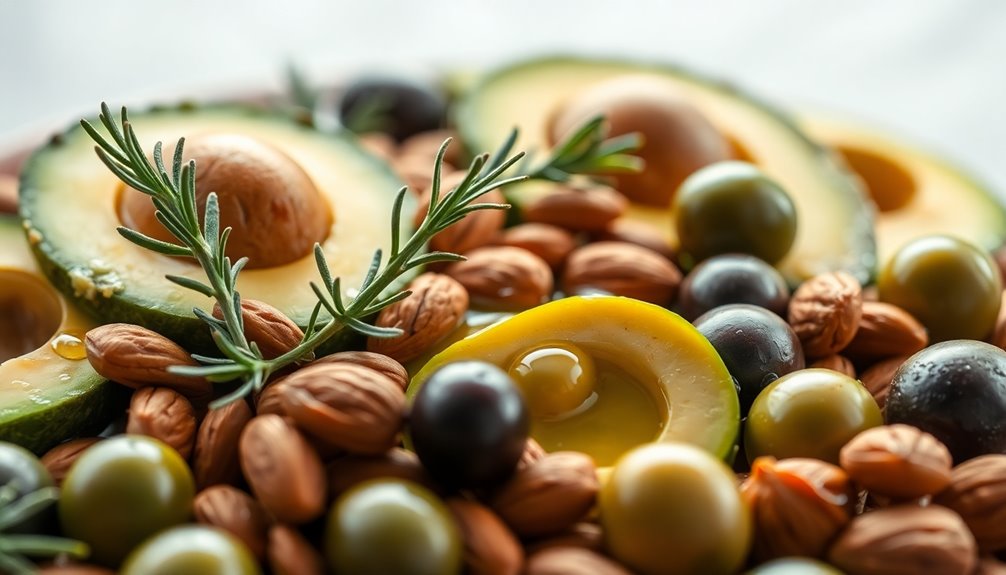
Incorporating healthy fats into your diet can significantly influence your overall health and well-being. Unlike unhealthy trans fats, healthy fats—like those found in avocados, nuts, and olive oil—offer numerous benefits that support essential bodily functions.
Here are four key impacts of healthy fats:
- Heart Health: Healthy fats can help lower bad cholesterol levels, reducing your risk of heart disease.
- Brain Function: Omega-3 fatty acids, found in fish and flaxseeds, are crucial for brain health and cognitive function.
- Nutrient Absorption: Healthy fats aid in the absorption of fat-soluble vitamins A, D, E, and K, ensuring your body gets the nutrients it needs.
- Satiety: Including healthy fats in your meals can help you feel fuller for longer, which may assist in weight management.
Hydration and Nutrient Absorption
Maintaining proper hydration is vital for your overall health and plays a significant role in nutrient absorption. When you drink enough water, your body can efficiently transport essential nutrients from the foods you consume to your cells. Dehydration can hinder this process, leading to nutrient deficiencies that affect your energy levels, immune function, and overall well-being.
Water acts as a solvent, breaking down nutrients and making them accessible for absorption in the digestive tract. Without adequate hydration, your body struggles to absorb vitamins, minerals, and other crucial compounds, which can result in suboptimal health outcomes. For instance, both fat-soluble and water-soluble vitamins rely on sufficient hydration for proper assimilation.
Additionally, staying hydrated helps maintain the mucosal lining of your gastrointestinal tract, ensuring efficient digestion. When the gut is well-hydrated, it can effectively absorb nutrients and eliminate waste products.
So, to support your nutrient absorption, aim to drink water consistently throughout the day. Incorporating hydrating foods, like fruits and vegetables, into your diet can also boost your fluid intake and enhance nutrient absorption.
Tips for Balanced Meal Planning
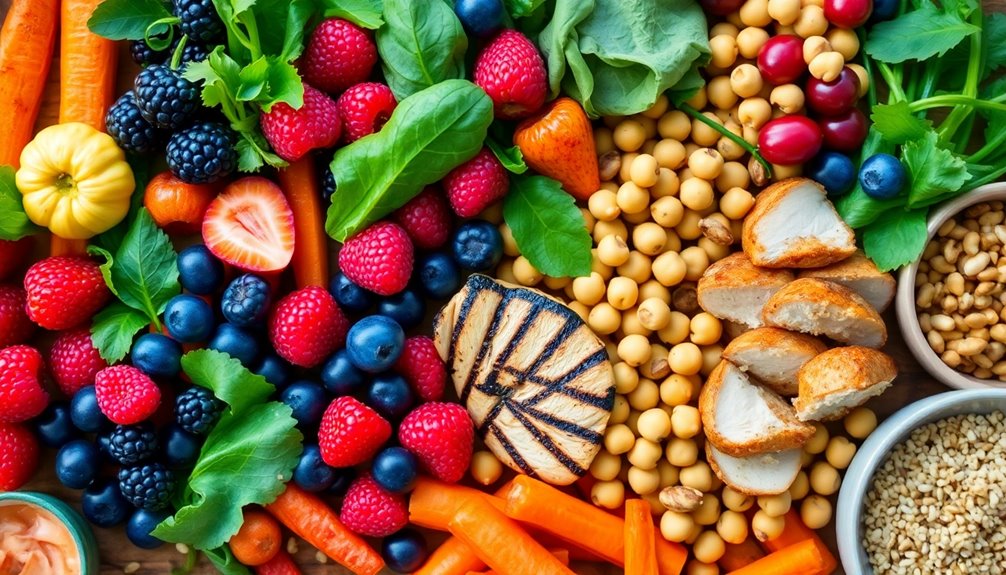
Creating a balanced meal plan can make a significant difference in your overall health and energy levels. To ensure you're getting essential nutrients, consider these practical tips:
- Incorporate Variety: Your meals should include different food groups—fruits, vegetables, whole grains, and proteins. This variety helps you cover all your nutrient bases.
- Portion Control: Pay attention to portion sizes. Using smaller plates can trick your mind into thinking you're eating more, while still keeping your portions in check.
- Plan Ahead: Set aside time each week to plan your meals. This saves you from last-minute unhealthy choices and allows you to use seasonal produce for better flavor and nutrition.
- Stay Flexible: Life can be unpredictable, so allow room for adjustments. If you can't stick to your plan one week, don't stress—just get back on track the next.
Frequently Asked Questions
Can I Get All Nutrients From a Vegetarian Diet?
Yes, you can get all nutrients from a vegetarian diet. By choosing a variety of fruits, vegetables, whole grains, legumes, nuts, and seeds, you'll ensure you're meeting your nutritional needs effectively and healthily.
How Do Cooking Methods Affect Nutrient Content in Foods?
Cooking methods can significantly affect nutrient content in foods. You'll retain more vitamins by steaming or microwaving rather than boiling. Grilling or roasting can enhance flavors but may reduce some nutrients due to high heat.
Are Supplements a Good Alternative to Whole Foods?
Sure, let's just pop a pill instead of eating! While supplements can help, they can't fully replace whole foods' benefits. You miss out on fiber, antioxidants, and that lovely taste. Real food's hard to beat!
What Are the Signs of Nutrient Deficiencies?
You might notice fatigue, brittle nails, hair loss, or frequent illnesses if you're experiencing nutrient deficiencies. Unexplained muscle cramps, skin issues, or mood swings can also signal that your body needs more essential nutrients.
How Can I Improve My Nutrient Absorption From Meals?
You've got to eat your cake and have it too! To boost nutrient absorption, combine foods rich in vitamin C with iron sources, cook vegetables lightly, and consider probiotics to enhance gut health and digestion.
Conclusion
Choosing nutrient-dense foods is like giving your body a superhero cape, empowering you to conquer each day with energy and vitality. By focusing on fruits, vegetables, whole grains, lean proteins, and healthy fats, you're not just fueling your body; you're unlocking a treasure trove of essential nutrients. Remember, hydration plays a crucial role in nutrient absorption, so drink up! With a little planning, you can create balanced meals that support your health and well-being like never before.

